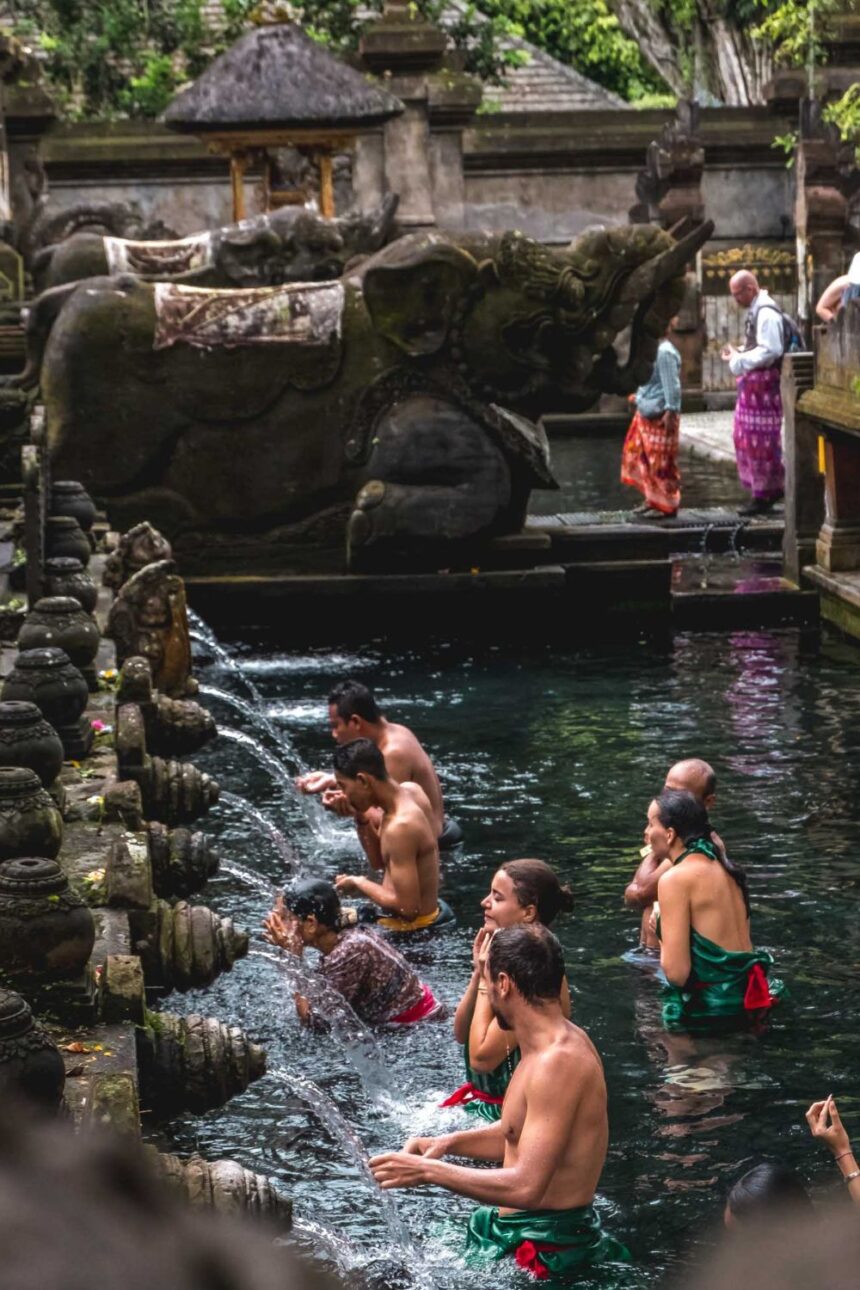Introduction: Why Ubud is the Heart of Bali’s Soul
When travelers think of Bali, the first images that often come to mind are pristine beaches, swaying palm trees, and vibrant sunsets. But beyond the coastline lies Ubud — a town that feels like Bali’s cultural and spiritual heartbeat. Nestled amidst lush rice terraces, ancient temples, and art-filled streets, Ubud has gained global fame as the soul of Bali, where tradition meets affordability.
- Introduction: Why Ubud is the Heart of Bali’s Soul
- 🌿 History of Ubud: Where Culture Meets Nature
- 🌸 Interesting Facts About Ubud
- 🗓 Timeline of Ubud’s Growth
- 🌍 Significance of Ubud in Bali and Beyond
- ✨ Cheap Vacation Ideas in Ubud
- 🌼 Wishing from Ubud
- 📌 Importance of Ubud in Daily Life & Society
- ❓ FAQs About Ubud
- 🌟 Conclusion: Ubud’s Everlasting Impact on Life and Travel
For those seeking cheap vacation ideas that combine history, wellness, art, and nature, Ubud is a gem. Unlike the pricey tourist hubs, Ubud offers a deeply authentic experience where travelers can stretch their budgets without compromising the richness of the journey.
This article explores Ubud’s history, facts, timeline, significance, FAQs, wishes, and its importance in daily life and society, to help you discover why this Balinese wonder should be on your bucket list.
🌿 History of Ubud: Where Culture Meets Nature
The name “Ubud” comes from the Balinese word “ubad”, meaning medicine, because the region was once famous for its medicinal plants and herbs. It has long been a center for healing, spirituality, and traditional medicine.
Historical Highlights:
8th Century: Ubud’s history can be traced back to when Rsi Markandeya, a Hindu priest from Java, established temples in the area, introducing Hinduism and wellness practices.
14th–19th Century: Ubud became an artistic hub, with royal patronage from the local Ubud palace supporting painters, sculptors, and dancers.
20th Century: Western artists and intellectuals like Walter Spies and Miguel Covarrubias settled here, further enriching Ubud’s cultural scene.
Modern Day: Ubud is celebrated worldwide as a center for yoga, meditation, Balinese dance, arts, and eco-tourism.
🌸 Interesting Facts About Ubud
Here are some fascinating facts that make Ubud unique:
Ubud is home to the Sacred Monkey Forest Sanctuary, where hundreds of long-tailed macaques live freely among ancient temples.
It has one of the most photographed landscapes in Bali — the Tegallalang rice terraces, a UNESCO-recognized cultural landscape.
The Royal Palace (Puri Saren Agung) still houses Ubud’s royal family and hosts nightly Balinese dance performances.
Ubud is the wellness capital of Bali, known for affordable yoga retreats, meditation centers, and spa treatments.
Unlike other tourist hubs, Ubud offers budget-friendly accommodations such as homestays where travelers can live like locals.
🗓 Timeline of Ubud’s Growth
8th Century – Birth of spiritual Ubud with Hindu temples.
14th–19th Century – Flourishing arts and cultural patronage by Ubud’s royals.
1930s – Arrival of foreign artists, merging Western and Balinese creativity.
1970s – Emergence as a traveler’s haven for affordable and cultural stays.
2000s – Growth of eco-tourism, wellness retreats, and yoga schools.
Today – Ubud thrives as Bali’s cultural and spiritual hub, attracting millions of visitors each year.
🌍 Significance of Ubud in Bali and Beyond
Ubud’s significance goes far beyond its beautiful landscapes:
Cultural Significance: It preserves traditional Balinese dance, art, woodcarving, and spiritual practices.
Economic Significance: Ubud’s tourism supports local artisans, farmers, and small businesses.
Spiritual Significance: Known as a healing place, Ubud attracts spiritual seekers, yogis, and wellness travelers worldwide.
Societal Significance: It balances tradition and modern tourism, showing how local culture can thrive alongside global influences.
✨ Cheap Vacation Ideas in Ubud
Traveling on a budget? Ubud offers plenty of affordable yet unforgettable experiences:
Visit the Sacred Monkey Forest Sanctuary – A small entry fee gives you access to temples and playful monkeys.
Explore Tegallalang Rice Terraces – Free to walk, with optional donations to local farmers.
Watch a Balinese Dance Performance – Affordable tickets at Ubud Palace or nearby temples.
Cycle Through Rice Fields – Rent a bike cheaply and explore stunning countryside routes.
Try Local Street Food – Nasi Goreng and satay sticks are filling and inexpensive.
Join a Yoga Class – Many community studios offer budget-friendly sessions.
Visit Ubud Market – Shop for souvenirs, textiles, and handicrafts at bargain prices.
Hike Campuhan Ridge Walk – A free trail offering scenic views of Ubud’s valleys.
Stay in Local Homestays – Experience Balinese hospitality at affordable rates.
Temple Visits – Ubud’s temples like Goa Gajah and Gunung Kawi offer cheap entry fees.
🌼 Wishing from Ubud
Visitors often leave Ubud with heartfelt wishes:
For Self: Peace, wellness, and balance in life.
For Others: Blessings of harmony, joy, and cultural appreciation.
For Society: The wish to preserve traditions while embracing mindful tourism.
📌 Importance of Ubud in Daily Life & Society
Ubud is not just for tourists — it plays an essential role in the daily life of locals and society at large:
Artisan Livelihoods: Many families depend on crafts like woodcarving, batik, and painting.
Agriculture: Rice farming is still a way of life, sustaining both locals and tourism.
Festivals: Ceremonies and festivals strengthen community bonds.
Global Inspiration: Ubud inspires wellness movements, eco-conscious living, and slow travel worldwide.
❓ FAQs About Ubud
Q1: Is Ubud expensive to visit?
No, Ubud is one of the most budget-friendly destinations in Bali, especially if you stay in homestays and eat local food.
Q2: What is Ubud most famous for?
It is famous for rice terraces, monkey forest, temples, wellness retreats, and Balinese art.
Q3: How many days are enough in Ubud?
At least 3–4 days are recommended to explore Ubud comfortably.
Q4: Can I explore Ubud on foot?
Yes, Ubud’s town center is walkable, but renting a bike or scooter is useful for nearby attractions.
Q5: Is Ubud safe for solo travelers?
Yes, Ubud is generally very safe, especially for solo women travelers.
🌟 Conclusion: Ubud’s Everlasting Impact on Life and Travel
Ubud is more than a travel destination — it’s an experience that nurtures the soul while being kind to the wallet. Its history, cultural richness, healing traditions, and affordability make it one of the best cheap vacation ideas for anyone seeking meaning in travel.
In daily life, Ubud teaches us about balance — balancing tradition with modernity, nature with art, and wellness with exploration.
So, whether you dream of wandering rice terraces, meditating in temples, or just savoring street food, Ubud welcomes you warmly. And the best part? You don’t need a fortune to enjoy its treasures.








